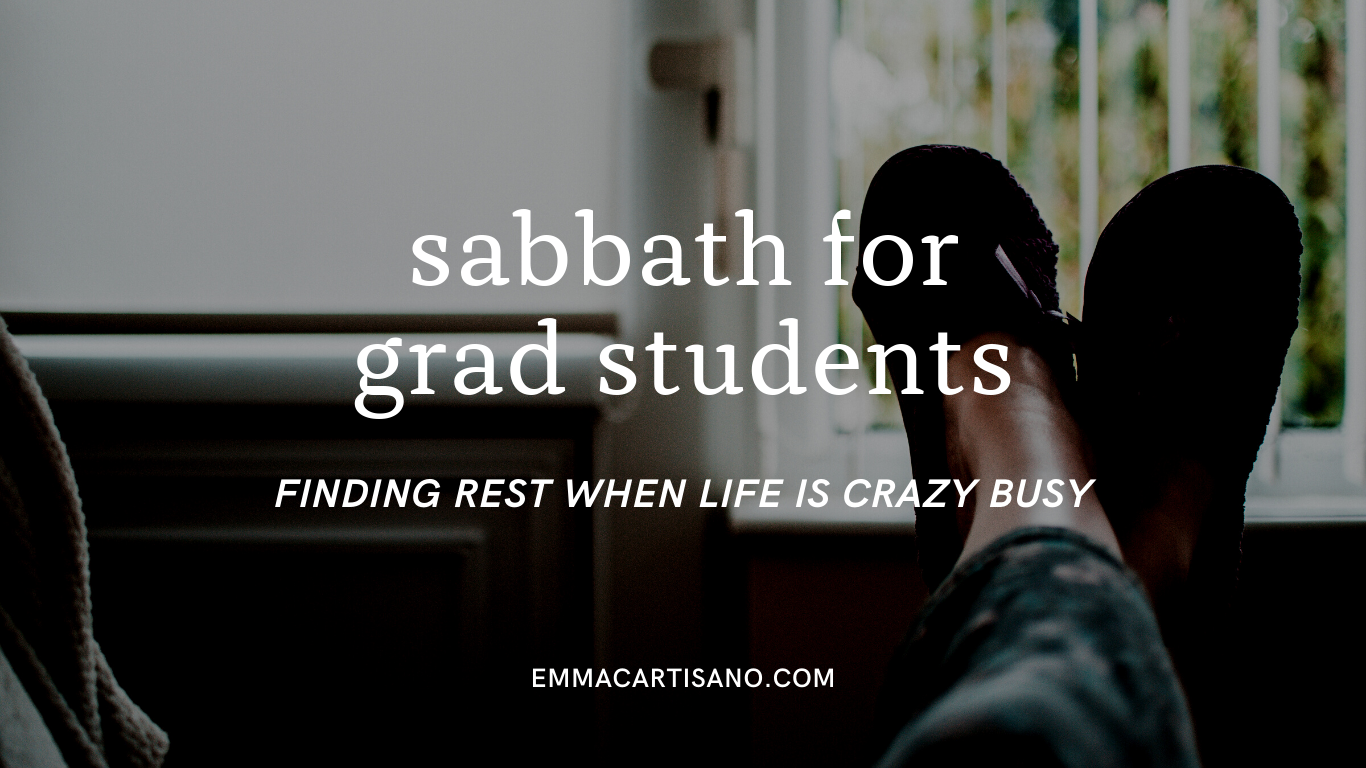Sabbath for grad students
Finding rest when life is crazy busy
Sabbath. If you’re unfamiliar with the term, sabbath is a period of rest and recovery that follows a period of work. For grad students, sabbath is especially important because of the long hours we work during the week. In order to show up as our best selves each Monday, we need a small, restorative break in our weekly rhythm.
What is sabbath?
Sabbath comes from the Greek word sabbaton or the Hebrew worth shabbāth, which means rest. In academia, we’re all familiar with the word sabbatical, which is a period of time when professors step away from teaching responsibilities to focus on other interests, like research, writing, or travel.
Sabbath is a similar concept that’s more traditionally understood as a weekly practice of stepping away from work. In some cultures, this is a whole 24 hour day. However, sabbath can be unique to each individual, ranging from just a few hours to the whole weekend depending on your job or life stage.
Why is sabbath important?
Sabbath is necessary for a healthy rhythm in our lives. We are not created to work 24/7, and if we try, we’ll run into a wall of burnout and our bodies will force us to take a break some way or another.
Grad school is notoriously grueling, often demanding students to work 60+ hours a week. And while there are times that we have to do that to meet deadlines or to be present for an experiment, this rhythm is pretty unsustainable in the long run.
Do you ever catch yourself fantasizing about what life will look like after you graduate and work a normal 9-5, either in the academy or in an industry? Here’s the hard truth: the habits you create now will follow you into your career. Want to be able to leave work at work? Practice doing that now. Shut your laptop off when you leave the office or lab, and keep it off until you return in the morning. Want to play with your kids on the weekend? Do that now, even if it’s only a few hours on Saturdays.
Sabbath is all about the rhythm of work and rest. Simply completing grad school will not magically create sabbath. You need to be intentional about incorporating rhythms of rest.
How do you implement sabbath into your own life?
Sabbath will look different for every person. I, for example, take a sabbath from Friday night to Sunday morning. My friend Mary, however, incorporates sabbath from 8am to noon on Wednesday morning because that’s what her schedule allows. The important thing is that you try.
With that, here are three easy tips to try for your sabbath.
1. Eliminate stressors
Consider shutting off your phone for the duration of your sabbath so you’re not distracted by the noise of the digital world. You’ll get a reprieve from social media, emails, and even texts. The world can wait a few hours. I promise.
This will be hard at first, but I bet you’ll soon come to appreciate these sacred, tech-free hours each week. We were not designed to be engaged with the world during every waking minute.
2. Incorporate your whole body
Consider this mantra: if you work with your mind, rest with your hands. Our grad student brains rarely shut off, right? This is why it’s especially important to use other parts of our body and focus on holistic health and wellbeing.
If you enjoy reading, go for it! But if you’re like me and can’t fathom opening another book after reading over 500 pages for school the previous week, then don’t. You can read for fun in a few years after you graduate.
Maybe you decide to learn a new hobby, like knitting or whittling or ultimate frisbee. Or maybe going on a long walk in a park is more your thing. Whatever it is you choose, try to use a part of your body that’s not your brain.
3. Do what’s rejuvenating
Try NOT to leave chores for your sabbath, no matter how tempting it is to push things off into that open time block on your calendar. Chores will drain you, and that’s not how we want to enter back into the rhythm of work!
Now, if you find joy in cleaning, that’s another story. But for most of us, having a long list of tasks like laundry, grocery shopping, cleaning, dusting, and so on will not lead to a restful sabbath.
Try to do things that are rejuvenating on the sabbath. Maybe that’s coffee with a friend or journaling or sleeping in. Maybe bingeing Netflix IS what you need one sabbath—just don’t make a habit of it! Have a plan, even if your plan is to have no plan. But make sure you enjoy yourself!
If you want to learn more about sabbath, I recommend reading some of John Mark Comer’s works, like The Ruthless Elimination of Hurry or Garden City: Work, Rest, and the Art of Being Human.
You deserve to rest. You work hard, and rest is the best self care you can give yourself. Sabbath honors yourself and those around you by allowing you to show up as your best self.
Go ahead and schedule a sabbath for this week on your calendar right now. It might be three hours on Friday night or all day Sunday—whatever fits. Remember, start small as you learn how to incorporate rhythms of rest into your grad student life.
As you go into this week, I want you to remember that you are resilient, capable, and worthy of rest. In case no one has told you recently, I want to be the one to affirm that by showing up each day, you’re doing a great job of pursuing your dream. I’m rooting for you!
Rest well this week.
